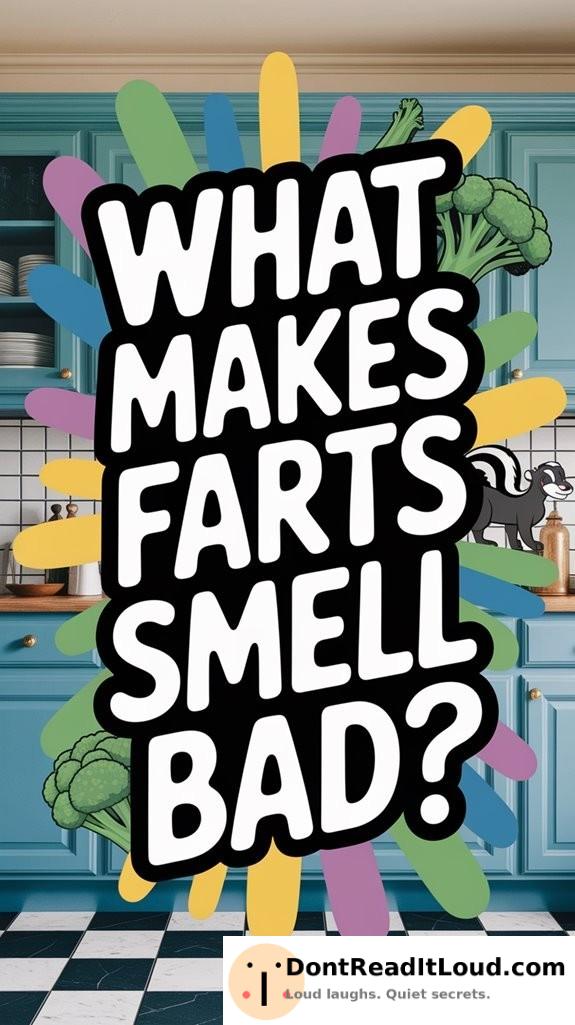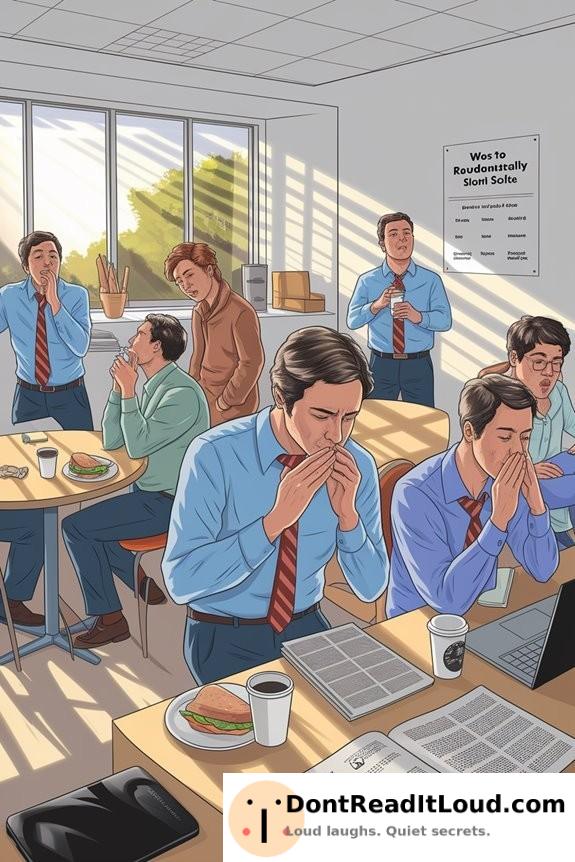
You smell bad farts because gut bacteria break down certain foods, especially those high in sulfur, like onions, beans, and broccoli. This process releases gases such as hydrogen sulfide and methanethiol, responsible for the rotten egg or pungent odor. Undigested food, fiber, and even lactose can also contribute, particularly if you’re lactose intolerant. If you want to know why some foods or conditions make it worse, stay tuned for more information.
The Digestive Process: How Gas Is Produced

Although it might seem unappealing, the digestive process naturally produces gas as your body breaks down food.
When you eat, digestive enzymes help break down complex carbohydrates, proteins, and fats into simpler parts. Some food particles aren’t fully digested and move into your intestines.
These undigested leftovers can interact with stomach acids or get further processed in the intestines, leading to gas. Swallowing air while eating or drinking also adds to the gas in your digestive system.
All these factors together create the gas that eventually leaves your body as a fart.
The Role of Gut Bacteria in Flatulence

While your digestive system does much of the food breakdown, trillions of gut bacteria also play a key role in producing gas.
Your gut microbiome, made up of many different microbes, helps digest food parts your body can’t handle alone.
These bacteria use a process called fermentation to break down undigested carbohydrates and fiber.
Fermentation releases gases like hydrogen, methane, and carbon dioxide as byproducts.
These gases build up and eventually leave your body as flatulence, sometimes with noticeable odors.
Sulfur Compounds: The Main Culprits

When your farts have a strong odor, sulfur compounds are usually responsible. As gut bacteria digest sulfur-containing amino acids, they release gases like hydrogen sulfide and methanethiol.
These substances create the classic rotten egg or cabbage-like smell. Your nose is highly sensitive to sulfur gases, so even a small amount can smell very strong.
Most gases in flatulence have no smell, but sulfur compounds are detected at incredibly low levels. This is why these gases make flatulence especially noticeable and unpleasant.
Foods That Intensify Odor

Certain foods can make your farts smell much worse by increasing the amount of sulfur compounds your gut bacteria produce.
Eating a lot of onions introduces extra sulfur into your digestive system, resulting in stronger odors.
Cruciferous vegetables like broccoli, cabbage, and Brussels sprouts are well-known for producing the same effect.
Spicy foods may not boost sulfur, but they can irritate your gut and speed up digestion, which makes smells more obvious.
For those who are lactose intolerant, dairy products can make the odor stronger because undigested lactose ferments in the gut, creating more foul-smelling gases.
How Fiber Affects Flatulence

Although fiber is essential for good digestion, it can also cause more flatulence as gut bacteria break it down.
Eating a mix of soluble and insoluble fiber improves digestive health, but you might notice increased gas.
Soluble fiber—found in oats, beans, and fruits—tends to create more gas since it ferments easily in your colon.
Insoluble fiber, which is present in whole grains and vegetables, usually results in less gas.
Gradually increasing your fiber intake and varying the types can benefit digestion without causing excessive gas.
Lactose Intolerance and Smelly Gas

If you have trouble digesting dairy, you might be lactose intolerant—a common condition that leads to smelly gas.
When your body can’t break down lactose, the sugar in milk, it passes to your colon undigested. There, bacteria break it down through fermentation, producing gases like hydrogen, carbon dioxide, and strong-smelling sulfur compounds.
That’s why your flatulence might be especially pungent after eating cheese, ice cream, or milk.
To manage symptoms, consider cutting back on lactose, trying lactase supplements, or choosing lactose-free products for easier digestion and less odor.
Health Conditions Linked to Strong Odors

While diet has a major impact on how your farts smell, certain health conditions can also make them particularly unpleasant.
If you have gastrointestinal disorders like irritable bowel syndrome or celiac disease, your body may struggle to digest food fully. This allows more undigested material to reach your colon, where bacteria create stronger-smelling gases.
Diseases such as Crohn’s or ulcerative colitis can also cause odors to worsen due to inflammation, infections, or trouble absorbing nutrients.
If you experience ongoing, foul-smelling gas along with other symptoms, talk to your doctor to rule out underlying health issues.
Ways to Reduce Unpleasant Smells

Reducing unpleasant fart smells starts with simple changes to your daily habits.
Begin by adjusting your diet—limit foods like beans, broccoli, and onions that contain sulfur. Drinking plenty of water supports digestion and helps reduce odors.
Make sure to air out your living space often. You can also use odor neutralizers such as sprays or plug-ins made for bathrooms.
For a natural approach, try essential oils like eucalyptus or peppermint to freshen the air.
Regular exercise improves digestion, which can help minimize odors.
Small changes can noticeably improve air quality.
Conclusion
Now you know why farts can smell bad—gut bacteria break down certain foods, especially those high in sulfur, and release foul-smelling gases. Foods like beans, broccoli, and dairy can make the odor stronger, especially if you’re lactose intolerant. Although it’s a normal part of digestion, you can reduce the smell by adjusting your diet and paying attention to gut health. Don’t worry—everyone experiences it, and it’s just a natural part of life!



